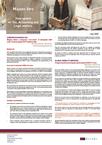
Mazars Info June 2020
CORPORATE INCOME TAX
Belgium allows a temporary “carry-back” of anticipated 2020 covid-19 losses against 2019 taxable profits.
Background
On 5 June 2020, after the first wave of supportive measures to mitigate the consequences of the COVID-19 crisis, the Council of Ministers introduced a draft law into the Belgian Parliament including new tax recovery measures.
These provisions aim to help companies to rebuild their liquidity and solvency position and include in particular the possibility for Belgian companies to carry-back the tax losses incurred during the COVID-19 crisis to compensate the taxable profits of the previous financial year.
Carry back of ‘estimated’ COVID-19 tax loss
Today, tax losses can only be carried forward and no carry-back to previous tax years exists (unless in the agricultural sector). As an exception to this general rule in Belgian tax law, Belgium will introduce an exceptional carry-back as a COVID-19 fiscal stimulus.
Belgian companies that expect to incur losses during the COVID-19 pandemic period
as from 13 March 2020, would be entitled to claim a temporary exemption of all or a
part of their taxable profit of the financial year preceding this taxable period, up to the
amount of such estimated tax losses. Such principle will allow Belgian companies to
deduct the estimated tax loss they expect to realize in the current financial year (“i.e. the
COVID-19 Year”) from the taxable profit of the tax year preceding the COVID-19 Year (“i.e.
the Deduction Year”).
This would reduce the taxable basis and corporate income tax due in the Deduction Year (in most cases thus the financial year ending as per 31 Dec. 2019) and effectively achieve a carry-back of the estimated COVID-19 Year tax loss.
This temporary carry back possibility would only be applicable for tax assessment years 2019 or 2020 (corresponding to FY’s ended in the period between 13 March 2019 and 12 March 2020) and would be granted through the creation of a temporary tax-exempt reserve to be deducted from the taxable reserves in that financial year via the corporate income tax return.
Conditions and limitations
Some important conditions and limitations will apply :
- The company may not have executed any form of reduction or distribution of equity (including buy back of own shares) for instance via a dividend distribution and/or capital reduction between 12 March 2020 and the filing of the tax return for tax year 2020, which is normally due by 24 September 2020.
- The maximum amount of the exemption is limited to the amount of the taxable result of the financial year (taxable result from the first operation not considering the impact of this temporary exemption and reduced by the dividends-received deduction and innovation income deduction) and is capped, to EUR 20 million.
- Certain companies will be excluded, such as collective investment vehicles or companies with a shareholding in a company located in a tax haven country, etc.
- An anti-avoidance scheme will apply in case the tax exempt reserves are overstated with more than 10 % compared to the actual Covid-19 loss and/or in case CIT rate arbitrage benefits (25,00% vs 29,58%) would apply.
If adopted by the Belgian Parliament, the measure is expected to enter into force at the date of the publication of the law in the Official Gazette.
This loss carry-back system will improve the cash flow of a number of companies suffering economically from the COVID-19 pandemic as they will be able to obtain repayment of FY19 corporate income taxes paid as result of the carry-back.
We advise our clients to carefully review this opportunity prior to submission of the FY2019 CIT return, due by 24 September 2020. (if the financial year coincides with the calendar year 2019).
GLOBAL MOBILITY SERVICES
Foreign executives working abroad during the COVID-19 crisis
Due to the COVID-19 crisis, a lot of international mobile employees are forced to work from home, as advised by several European Member States. In the Guidelines for crossborder employment we published earlier, we already raised the question on what the impact would be for employees benefitting from the special tax regime for foreign executives in Belgium, and more specifically for the ‘travel exclusion’ computation.
As you may know, the special tax regime for foreign executives was introduced by the Circular letter of August 8, 1983 to attract foreigners to work (temporarily) in Belgium in positions that require special knowledge and/or responsibility. One of the benefits of this special tax regime, is that these expatriates will fictionally be considered as Belgian non-residents and consequently will only be taxable on their Belgian sourced income. Income earned during working days performed outside Belgium are excluded from the taxable basis in Belgium.
As a lot of expatriates are working outside Belgium during COVID-19 crisis (for example temporarily teleworking in their home country or being stuck abroad due to travel restrictions), the question arose whether those days worked abroad would be exempted from taxation in Belgium (and thus be considered as travel exclusion days.) Based on our recent contacts with the Belgian tax authorities, we can inform you that during the COVID-19 crisis, the following rules will apply depending on the applicable base scenario:
1. The expatriate stays in a country where he is considered as a tax resident for income tax purposes and Belgium has signed a double tax treaty with this country:
The income related to the days performed abroad (including telework) is taxable in the country where the expatriate is staying (based on article 15 of the OECD Model Convention).
2. The expatriate stays in a country where he is not considered as a tax resident for income tax purposes, but this country is considered as his home country or is a country where he has a house at his disposal and Belgium has signed a double tax treaty with this country:
All teleworking days abroad are considered as if the work would have been performed in Belgium, as the stay in the other country is a personal choice. Consequently, the income related to the days performed abroad is taxable in Belgium.
3. The expatriate stays in a country where he is not considered as a tax resident for income tax purposes and this country is not considered as his home country (no ties) and Belgium has signed a double tax treaty with this country:
This scenario will be applicable if the expatriate has no ties with the country he is staying in, but is forced to stay there due to e.g. travel restrictions. The income related to these days performed abroad (including telework), will be exempted from taxation in Belgium and will be considered as travel exclusion days.
4. The expatriate is teleworking in Belgium
The income related to the days working from home in Belgium is considered as taxable in Belgium because these days have been performed in Belgium.
Until when these tolerances for expatriates will be applied, was not yet communicated by the Belgian tax authorities. We assume this will be in line with the other governmental measures.
Would you have any questions about your specific situation, please do not hesitate to contact someone of our Global Mobility Team.
PERSONAL INCOME TAX
Changes to the Belgian personal income tax return
Legal aid insurance
Premiums paid as from September 1, 2019 for a legal aid insurance are, under certain conditions, tax deductible up to EUR 310,00 for income year 2019. The tax deduction amounts to 40%, leading to an actual tax reduction of maximum EUR 124,00.
Donations in kind during the COVID-19 crisis
For the period from March, 1 2020 until June, 30 2020 donations in kind can, under
certain conditions, give right to a tax reduction of 45%. More specifically, it concerns
donating medical equipment to:
- Belgian university hospitals and their foundations;
- Public Centers for Social Welfare (‘OCMW’) and their hospitals;
- The Red Cross of Belgium;
- Institutions assisting the disabled, the elderly and protected minors.
Also, donating computers to schools can qualify for this tax reduction.
Child care expenses during the COVID-19 crisis
In principle, only a tax reduction can be awarded if child care services have actually taken place. When a child does not participate in a child care activity, even when it was already paid for, the expenses are not eligible for a tax relief.
Recently, the Belgian tax authorities have announced a temporary tolerance for child care activities that were cancelled during the COVID-19 crisis. Under certain conditions, the expenses that were already paid (and not recovered) can give right to the tax reduction of 45%, taken into account the maximum amount of EUR 11,20 per day.
This exception applies as from March 14, 2020 until the end of the COVID-19 measures (which still has to be confirmed).
Would you have any questions about your specific situation, please do not hesitate to contact us.
LEGAL
Suspension of the notice period in the event of temporary unemployment on grounds of force majeure (COVID-19)
On Thursday 11 June 2020, the proposal of law to suspend the notice period in the case of temporary unemployment in cases of force majeure was adopted by the Belgian Parliament. The purpose of this law is to ensure that the notice period given by the employer is suspended during the period of temporary unemployment due to force majeure (COVID-19).
The adjustment has the following consequences:
The notice periods to be performed will henceforth be extended by the periods during which the employee is temporary unemployed due to force majeure (COVID-19 related);
Employees of which the employment agreements have already been terminated and for which the notice period is still running on the day of publication of the new law in the Belgian Official Gazette, can also rely on an extension of the notice period, unless the notice period was already given on March 1, 2020.
The suspension only applies in case of termination of the employment agreement by the Employer. In case of termination by the Employee, no suspension of the notice period is due. Unlike the initial proposal of law, the amendment only applies from the moment of the publication in the Belgian Official Gazette.
KEEP IN MIND!
VAT
- VAT return June 2020 : July 20, 2020 (payment)
- VAT return Q2/2020 : July 20, 2020 (payment)
PAYROLL
- Wage withholding taxes June 2020 : July 15, 2020
- Third monthly prepayment for social security contributions Q2/2020 : July 5, 2020
- Balance social security contributions Q2/2020 : July 31, 2020
- First monthly prepayment for social security contributions Q3/2020 : August 5, 2020
- Second monthly prepayment for social security contributions Q3/2020 : September 5, 2020
CORPORATE INCOME TAX
- Forms 281.50 - calendar year 2019 : June 29, 2020
- Prepayment corporate income tax Q2/2020 : July 10, 2020
- CRS filing 2019 : September 30, 2020 (extended deadline)
- Corporate income tax return - companies (balance date: 31/12/2019) : September 24, 2020
- Localfile Form : September 24, 2020
PERSONAL INCOME TAX
Personal income tax return - Belgian residents
- On paper: June 30, 2020
- Via Tax-on-web: July 16, 2020
- Via proxyholder (Tax-on-web): October 22, 2020

